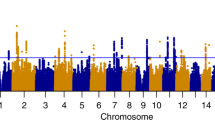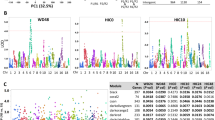Abstract
IT is not known whether alcoholism is an inherited disease, although some aspects of this complex disorder have been shown to be genetically determined. One might expect that genetic factors could influence either the tendency of an individual to drink excessively or the sensitivity of individuals to the effects of a given alcohol intake, or both. Most genetic work has dealt with drinking behaviour. For example, it is well known that inbred strains of mice differ in voluntary alcohol intake1. In man, twin studies have shown higher concordance in monozygotic than dizygotic pairs with respect to patterns of drinking2,3. Alcoholism is frequent among offspring of alcoholics, even when raised away from their biological parents4,5. Genetic differences in sensitivity to acute effects of alcohol have been shown in mice6 and in human populations (Caucasoid compared with Mongoloid)7. I report here that genes influence the severity of alcohol withdrawal effects in mice. This may mean that vulnerability to physical dependence can be inherited.
This is a preview of subscription content, access via your institution
Access options
Subscribe to this journal
Receive 51 print issues and online access
$199.00 per year
only $3.90 per issue
Buy this article
- Purchase on Springer Link
- Instant access to full article PDF
Prices may be subject to local taxes which are calculated during checkout
Similar content being viewed by others
References
McClearn, G. E., and Rodgers, D. A., Q. Jl Stud. Alc., 20, 691 (1959).
Kaij, L., Alcoholism in Twins (Almqvist and Wiksell, Stockholm, 1960).
Partanen, J., Bruun, K., and Markkanen, T., Inheritance of Drinking Behavior (Finnish Foundation for Alcohol Studies, Helsinki, 1966).
Goodwin, D. W., Schulsinger, F., Hermansen, L., Guze, S. B., and Winokur, G., Arch. gen. Psychiat., 28, 238 (1973).
Schuckit, M. A., Ann. N. Y. Acad. Sci., 197, 121 (1972).
Kakihana, R., Brown, D. R., McClearn, G. E., and Tabershaw, I. R., Science, N. Y., 154, 1574 (1966).
Wolff, P. H., Science, N. Y., 175, 449 (1972).
Goldstein, D. B., and Pal, N., Science, N. Y., 172, 288 (1971).
Goldstein, D. B., J. Pharmacol. exp. Ther., 180, 203 (1971).
Lundquist, F., Methods biochem. Anal., 7, 217 (1959).
Goldstein, D. B., J. Pharmacol. exp. Ther., 183, 14 (1972).
Goldstein, D. B., Psychopharmacologia (in the press).
Schlesinger, K., and Griek, B. J., in Contributions to Behavior Genetic Analysis, The Mouse as a Prototype, 219 (Appleton-Century-Crofts, New York, 1970).
Author information
Authors and Affiliations
Rights and permissions
About this article
Cite this article
GOLDSTEIN, D. Inherited Differences in Intensity of Alcohol Withdrawal Reactions in Mice. Nature 245, 154–156 (1973). https://doi.org/10.1038/245154a0
Received:
Revised:
Issue Date:
DOI: https://doi.org/10.1038/245154a0
This article is cited by
-
Use of a Novel Mouse Genotype to Model Acute Benzodiazepine Withdrawal
Behavior Genetics (2007)
-
Seven generations of genetic selection for ethanol dependence in mice
Behavior Genetics (1992)
-
Mouse lines selected for genetic differences in diazepam sensitivity
Psychopharmacology (1987)
-
Bidirectional selection for susceptibility to ethanol withdrawal seizures inMus musculus
Behavior Genetics (1985)
Comments
By submitting a comment you agree to abide by our Terms and Community Guidelines. If you find something abusive or that does not comply with our terms or guidelines please flag it as inappropriate.



